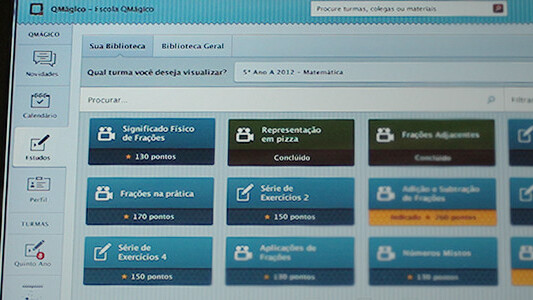
Thiago Feijão was one of the panelists speaking at Entrepreneur Week Brazil, which took place for the first time in Rio de Janeiro last week. As the co-founder of edtech startup QMágico, he talked about social entrepreneurship and education opportunities in Brazil.
TNW: What problem is QMágico tackling?
Thiago Feijão: Around the world, technology has been seen as a promise to scale high-quality education. Reports from UNESCO and the Inter-American Development Bank (IDB) have indicated that academic standards are low and not improving in a huge amount of countries.

At the same time, technology programs, like the One Laptop Per Child (OLPC) initiative, have not provided meaningful results in some countries, such as Peru, especially when it comes to integrating computers into regular pedagogical practices.
A potential solution for that issue would be intelligent software aligned with curriculum as a tool to empower teachers, which is exactly the value proposition of QMágico. My team’s ambition is to bring innovation and state of the art technologies to positively transform the education field
TNW: How did QMágico start and what does it do now?
TF: QMágico started as a free platform with videos and exercises, combined with simplified software allowing users to track their performance. The idea was to take the successful education model of the NGOs that I had formerly founded, and help it become sustainable and scalable.
While looking for ways to maintain a free platform, we noticed a huge business opportunity: K-12 schools and higher education institutions were willing to use their own proprietary content, videos and exercises, to run on our tool. To answer this demand, we created a subscription-based product with a more sophisticated software.
This tool allows teachers to add content to the platform, and to track their student’s performance from their computer both historically and in real-time, individually or in groups. Teachers and schools can build a curriculum, create lesson plans, assign tests and quizzes, while students can participate in collaborative study groups doing their homework. Additionally, we provide clients with a range of services, including extensive training, platform customization, and content organization.

Concomitantly, we are tracking a lot of user data, which will lead us to personalize our user learning experience and to empower teachers. For instance, we are developing intelligent software to meet individual and collective needs of learners and instructors, and assist in daily educational interventions within organizations. Launched at the end of May 2012, QMágico is already using data analysis to help identify efficient education interventions on classroom, schools and school districts around Brazil. We already have almost 10,000 students in over 450 schools with access to our paid platform. In our free of charge platform, we have over 50,000 users registered.
At this point, QMágico’s vision for its technology also extends beyond the classroom. It can be offered also as an educational tool for workers to continued education or on-the-job training within organizations.
TNW: Your site explains that you are inspired by pedagogical aspects of Blended Learning. Can you define this concept?
TF: As an EdSurge-inspired fan: Any program that combines a face-to-face learning program away from home, for instance in schools, and a computer-mediated activity with some student control over time, place, path, and/or pace.
TNW: What was your experience before QMágico?
TF: I am a 23-year-old undergrad in Mechanical-Aeronautical Engineering at Technological Institute of Aeronautics (ITA) and a Fundação Estudar fellow.
I have been working with education since 2008. I taught at public and private schools and education-related NGOs in Brazil. Additionally, I was the HR Director and President of an education NGO, and have founded two other ones – all of them addressing issues of low-income students from mid school to college.
I then consulted for the IDB and the National Industry Confederation (CNI) on an edtech project. I have structured a team to design and develop an educational platform focused on providing professional training to low-income young people.
TNW: Do you consider yourself a social entrepreneur? Why?
In 2010, I had the privilege to participate in a class taught by an Harvard Business School professor called Michael Chu, who is an expert in social entrepreneurship, as part f a Fundação Estudar event in Brazil. The title was something like: “Business solutions to social issues.”
During that class, I learnt about social enterprises or social businesses and about the way they could generate high social impact due to their activities and also above average financial returns.
Additionally, I also understood that winning over poverty requires four conditions: massive scale, sustainability across generations, continuous efficacy (a model that gets better every day) and continuous efficiency (a model that gets cheaper every day).
QMágico is making the successful model of an education-related NGO sustainable and scalable. Therefore, It can be defined as a Social Enterprise and I am one of the entrepreneurs.
TNW: How do you feel about QMágico’s victory at Startup World: Brazil?
 TF: Enthusiastic! Honored! I do hope that the grand finale in Silicon Valley will be an opportunity for us to show tangible results about the edtech innovation in Brazil.
TF: Enthusiastic! Honored! I do hope that the grand finale in Silicon Valley will be an opportunity for us to show tangible results about the edtech innovation in Brazil.
What are the next milestones for QMágico?
TF: Five months after our launch, QMágico currently has a finished product and business model vision. We are testing our market fit while serving our first clients, defining our processes, acquiring new clients, establishing partnerships and refining our product.
Our main short-term goal is to structure our distribution channel and improve our support services to scale at solid pace. We want to benefit instructors and learners internationally in around 2 years.
Get the TNW newsletter
Get the most important tech news in your inbox each week.





